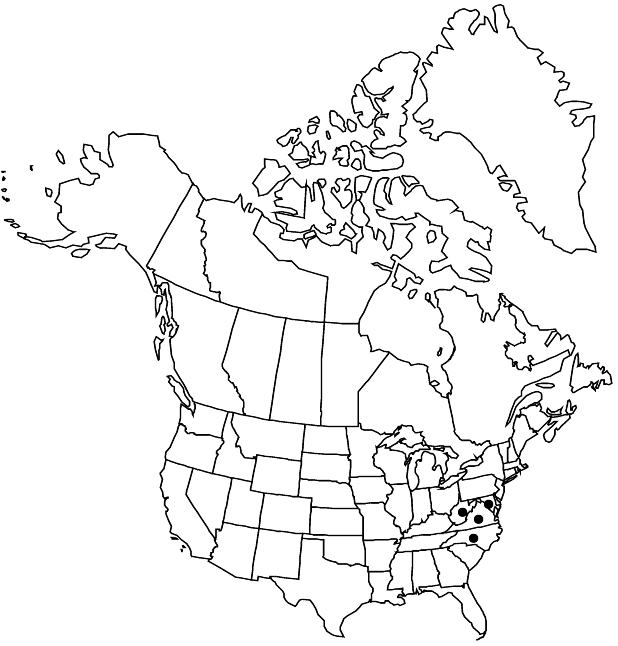Difference between revisions of "Heuchera americana var. hispida"
Rhodora 81: 576. 1979 ,.
FNA>Volume Importer |
FNA>Volume Importer |
||
| Line 7: | Line 7: | ||
}} | }} | ||
|common_names=Stiffly short-hair or hairy alum-root | |common_names=Stiffly short-hair or hairy alum-root | ||
| − | |basionyms={{Treatment/ID/ | + | |basionyms={{Treatment/ID/Basionym |
|name=Heuchera hispida | |name=Heuchera hispida | ||
|authority=Pursh | |authority=Pursh | ||
| + | |publication_title=Fl. Amer. Sept. | ||
| + | |publication_place=1: 188. 1813 | ||
}} | }} | ||
|synonyms= | |synonyms= | ||
| Line 26: | Line 28: | ||
|elevation=200-1300 m | |elevation=200-1300 m | ||
|distribution=Md.;N.C.;Va.;W.Va. | |distribution=Md.;N.C.;Va.;W.Va. | ||
| − | |discussion=<p>Variety hispida occurs in the mountains and hills of western Maryland and Virginia, eastern West Virginia, and Surry County, North Carolina, where <i></i>var.<i> americana</i> and <i>Heuchera pubescens</i> overlap; it is intermediate between <i></i>var.<i> americana</i> and <i>H. pubescens</i> in floral characters. Variety hispida was confused with <i>H. richardsonii</i> for almost a century, beginning in 1849 when Gray reduced <i>H. richardsonii</i> to synonymy under <i>H. hispida</i>, after some seeds of <i>H. richardsonii</i> germinated among <i>H. hispida</i> plants in a labeled plot and later replaced them (C. O. Rosendahl et al. 1933).</p> | + | |discussion=<p>Variety hispida occurs in the mountains and hills of western Maryland and Virginia, eastern West Virginia, and Surry County, North Carolina, where <i></i></i>var.<i><i> americana</i> and <i>Heuchera pubescens</i> overlap; it is intermediate between <i></i></i>var.<i><i> americana</i> and <i>H. pubescens</i> in floral characters. Variety hispida was confused with <i>H. richardsonii</i> for almost a century, beginning in 1849 when Gray reduced <i>H. richardsonii</i> to synonymy under <i>H. hispida</i>, after some seeds of <i>H. richardsonii</i> germinated among <i>H. hispida</i> plants in a labeled plot and later replaced them (C. O. Rosendahl et al. 1933).</p> |
|tables= | |tables= | ||
|references= | |references= | ||
| Line 50: | Line 52: | ||
|publication year= | |publication year= | ||
|special status= | |special status= | ||
| − | |source xml=https://jpend@bitbucket.org/aafc-mbb/fna-data-curation.git/src/ | + | |source xml=https://jpend@bitbucket.org/aafc-mbb/fna-data-curation.git/src/f6b125a955440c0872999024f038d74684f65921/coarse_grained_fna_xml/V8/V8_182.xml |
|genus=Heuchera | |genus=Heuchera | ||
|species=Heuchera americana | |species=Heuchera americana | ||
Revision as of 20:28, 24 September 2019
Petioles glabrous or very short stipitate-glandular. Flowers: hypanthium free 1.5–2 mm, campanulate; petals purple or pink, wider than sepals, margins fimbriate. 2n = 14.
Phenology: Flowering Apr–Jun.
Habitat: Rich woods often over base-saturated granite and gneiss, or in shallow rocky soil
Elevation: 200-1300 m
Distribution

Md., N.C., Va., W.Va.
Discussion
Variety hispida occurs in the mountains and hills of western Maryland and Virginia, eastern West Virginia, and Surry County, North Carolina, where var. americana and Heuchera pubescens overlap; it is intermediate between var. americana and H. pubescens in floral characters. Variety hispida was confused with H. richardsonii for almost a century, beginning in 1849 when Gray reduced H. richardsonii to synonymy under H. hispida, after some seeds of H. richardsonii germinated among H. hispida plants in a labeled plot and later replaced them (C. O. Rosendahl et al. 1933).
Selected References
None.